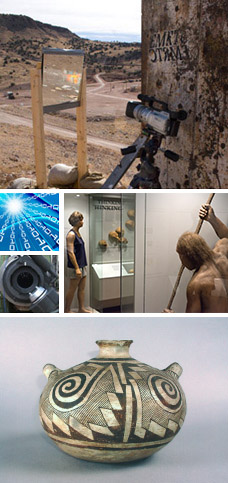
plays. It was a perfect way to launch th
e motion picture business in New Mexico. During the early experimental years of the cinema, movies were offered to audiences along with many other amusements including stereopticon displays, concerts by local and nationally known singers, sEMRTCpeeches, skits, juggling and gymnastic performances, and just about an
ything else that
- Electrical Engineering Department - Robotics Program grant of $27,000 to develop a low-cost robot for use in mine clearing operations.
- would sell tickets. Community opera houses like the Duncan Opera House in Las Vegas and the Elks Opera House in Silver City were quickl
- y equipped with film projectors to fulfill the public's fascination with movies. The first decade of the 20th century unveiled the first true cinemas or "arcades" in New Mexico. At first, the movie houses were modest, no-frills auditoriums, still evolving toward the great theatres built between World War I and II. Silver City's first cinema, the Airdome of 1909, was an industrial warehouse-type structure. Before the Apollo Theatre was built in 1918 in the bustling oil-patch
- Tours/Demonstrations - A number of tours and demonstrations for visitors to New Mexico Tech are conducted year-round by EMRTCtown of Artesia, movies were shown inside a large tent. New Mexico's first cinemas als

